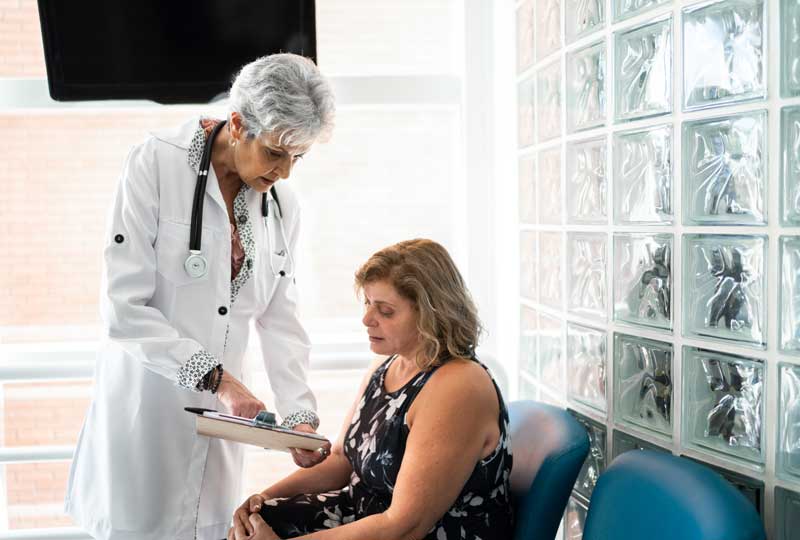Plus, how patient pathways expand access to organ donation.
To qualify for a kidney transplant, you must have advanced chronic kidney disease or be on dialysis. But, even if you meet the basic criteria for a kidney transplant, eligibility is still weighed on an individualized basis for your health and safety. If you’re a potential kidney transplant candidate, you’ll need to undergo several evaluations to ensure a transplant is the right treatment plan for you.
Patient evaluation for kidney transplant eligibility
Undergoing a kidney transplant involves a lifetime commitment. “Organs in general are a scarce resource,” said Kristin Smith, MSN, RN, CNL, CCTC, the manager for abdominal transplant at the Vanderbilt Transplant Center. “So we have to make sure that people who are getting them are able to take care of them.”
Patients who meet medical need for a kidney transplant will undergo an evaluation with a social worker to ensure they have a good support system to help them through the transplant process.
Organ transplants are a major surgery that involve a complex medication regimen and many follow-up appointments. “We really want to make sure that there’s somebody or multiple people who are able to support that person through the transplant,” Smith explained.
Additionally, the social worker will help determine whether a kidney transplant will place a burden, financial or otherwise, on a patient and look for ways to alleviate those burdens if possible.
Patients also undergo various medical examinations and screenings to ensure they are physically healthy enough to undergo kidney transplant surgery. Tests may include bloodwork, imaging, routine cancer screenings, etc.
“We’re a large institution and a large transplant center,” Smith said. “So with our specialties, we have a lot more pathways to transplant.”
In some cases, Vanderbilt can work with patients to improve their health to increase eligibility for a kidney transplant. For example, having a body mass index (BMI) over 45 generally disqualifies patients from getting a kidney transplant for several reasons, including wound-healing concerns.
“We have partnered with our bariatric surgical clinic,” Smith said, “to provide a pathway for patients who may meet criteria for surgical weight loss programs to help them lose the weight that they need to become a candidate for transplant.”
Expanded access
Increased patient pathways, more organ availability and more options all help Vanderbilt boost patient access to kidney transplants.
“Vanderbilt now does transplants using organs from donors who are infected with hepatitis C,” Smith explained. The organ recipient will then get hepatitis C, but they’ll be cleared of the infection within weeks. “Because of the new treatment options available for hepatitis C and the cure rate with these new treatments, we are able to successfully use these organs, which tend to be from young, otherwise healthy individuals.”
Vanderbilt has completed more than 120 transplants over the course of two years from organ donors who had hepatitis C, Smith said. “Using these kidneys does allow some people to have shorter wait times,” she added.
Patients can also undergo multiorgan transplants when needed with both procedures completed within hours of each other. “And we do A2 to B transplants,” Smith added. This pathway helps patients who have a B blood type avoid traditionally longer wait times.
“Vanderbilt also has a robust living donor program,” Smith said. “We help facilitate more than 70 living donation transplants a year. And we offer options for paired donation.” When a patient has a living donor who is not compatible to donate to them directly, they can still receive a transplant through an exchange.
Exchanges work through the National Kidney Registry or through Vanderbilt’s patient pool. “We offer ways for that donor to donate to somebody else who also has an incompatible donor,” Smith explained, “so that multiple recipients can get a living donor transplant.” Recently, Vanderbilt completed a record with a four-way living donor exchange involving four organ donors and four recipients — all Vanderbilt patients, she added.

The Vanderbilt Kidney Transplant Program is one of the largest programs in the country. Its surgeons have performed more than 6,000 pediatric and adult kidney transplants. The team has deep expertise with even the most complex cases. Clinics in Clarksville, Tennessee, and Madison, Alabama; and a telemedicine clinic in Jackson, Tennessee, bring expert kidney care closer to those communities. Vanderbilt surgeons also treat veterans by working with the Nashville VA to provide pre- and post-transplant care.

